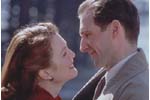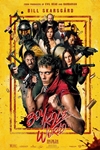The End of the Affair (R) ★★★
 Anyone who thinks ''The End of the Affair'' is your standard wartime love story has another think coming. This remote tale of jealousy and promises, beautifully directed by Neil Jordan, stands on its own for reaching, shall we say, spiritual heights.
Anyone who thinks ''The End of the Affair'' is your standard wartime love story has another think coming. This remote tale of jealousy and promises, beautifully directed by Neil Jordan, stands on its own for reaching, shall we say, spiritual heights.
Novelist Maurice Bendrix (Ralph Fiennes) is shown at his typewriter, tapping furiously to keep up with his flood of memories. He recalls, in his ''diary of hate,'' his love affair with Sarah (Julianne Moore) and its abrupt end two years ago. He strives to forget her, but her husband, Henry (Stephen Rea), mentions to Bendrix his suspicions of an affair, and Bendrix's jealousy stirs again.
Bendrix and Sarah first meet at her husband's party. Within minutes, he is asking her about the state of her dull marriage, to which she replies matter-of-factly, ''Henry prefers habit to happiness.'' Their attraction is instant, and a movie-and-dinner date the next night (innocently suggested by Henry) ends in a forbidden encounter of lust.
The affair continues, but during the 1940 London Blitz during World War II, a bomb strikes Bendrix's house while he and Sarah are in it. Bendrix lies motionless, seemingly dead, but when he awakes, a hysterical Sarah leaves him for good.
While he recalls these events in the present, Bendrix hires a private investigator (a gloriously bumbling Ian Hart) who follows Sarah, sometimes using his young son (Samuel Bould) as a prop. He hides around corners, sneaks into parties and finally unlocks for Bendrix the identity of the ''other man'' and the reason for their breakup -- but the story doesn't end there.
Adding to the complexity of the love triangle is Sarah's spiritual discovery, which should stir plenty of after-film conversation for moviegoers. The mystical twists baffle the atheistic Bendrix, whose hatred now focuses on God.
The story is based on Graham Greene's autobiographical novel of the same name, inspired by his affair with married American Catherine Walston. Jordan, who also wrote the screenplay, creates a complex narrative structure, jumping between flashback and present, sometimes replaying the same scene with different camera angles to alternate the characters' point of view.
He also coaxes subtle intensity from Fiennes, whose best scenes occur when he tries to mask his obsession for Sarah rather than unleash it, and Moore, whose American blood is successfully hidden under the British accent and mannerism she earlier sported in ''An Ideal Husband.''
Frequent Jordan collaborator Stephen Rea turns in a wonderfully nuanced performance as the not-so-oblivious husband, making a throwaway role significant. His weathered, basset-hound expression garners sympathy when he sits forlorn in the rain confronting Bendrix, or when he begs Sarah to please ''stick it out'' -- just as she's finishing a letter asking him for a divorce.
The big flaw in ''The End of the Affair'' is its inability to engage the audience in the romance. Despite Fiennes' penetrating stare and Moore's tortured expressions, their chemistry seems a bit frigid -- even in their love scenes -- and lines like ''You think love ends just because we don't see each other?'' don't carry as much weight.
It's also hard to root for Fiennes' character, whose writer measures love by his jealousy and reacts with selfishness once he learns of Sarah's sacrifice for him. You're not quite convinced that they're meant to be together, and that disbelief trickles down into the rest of the film.
Still, Jordan uses gray London in World War II as the perfect backdrop for the cold tones of the romance, wrapping the characters in clouds and rain, urging the audience to imagine that under all the topcoats, hats and umbrellas, passion resides inside.
* MPAA rating: R, for scenes of strong sexuality.
''The End of the Affair''
Ralph Fiennes: Maurice Bendrix
Stephen Rea: Henry Miles
Julianne Moore: Sarah Miles
Heather Jay Jones: Henry's maid
James Bolam: Mr. Savage
A Sony Pictures presentation. Director Neil Jordan. Screenplay Neil Jordan. Novel Graham Greene. Producers Neil Jordan and Stephen Wolley. Director of Photography Roger Pratt. Editor Tony Lawson. Production Designer Anthony Pratt. Costume Designer Sandy Powell. Art Directors Jon Billington and Tony Woollard. Set Decorator Joanne Woollard. Running time: 1 hour, 45 minutes.
To get the full Quicklook Films experience, uncheck "Enable on this Site" from Adblock Plus
box office top 10

Challengers Released: April 26, 2024 Cast: Zendaya, Josh O'Connor 15M

Unsung Hero Released: April 26, 2024 Cast: Daisy Betts, Joel Smallbone 7.8M

Godzilla x Kong: The New Empire Released: March 29, 2024 Cast: Rebecca Hall, Brian Tyree Henry 7.2M

Civil War Released: April 12, 2024 Cast: Kirsten Dunst, Wagner Moura 7M

Abigail Released: April 19, 2024 Cast: Melissa Barrera, Dan Stevens 5.3M

The Ministry of Ungentlemanly Warfare Released: April 19, 2024 Cast: Henry Cavill, Eiza Gonzalez 3.9M

Kung Fu Panda 4 Released: March 8, 2024 Cast: Jack Black, Viola Davis 3.6M

Ghostbusters: Frozen Empire Released: March 22, 2024 Cast: Paul Rudd, Carrie Coon 3.3M

Dune: Part Two Released: March 1, 2024 Cast: Timothée Chalamet, Rebecca Ferguson 2M

Boy Kills World Released: April 26, 2024 Cast: Bill Skarsgård, Famke Janssen 1.7M






